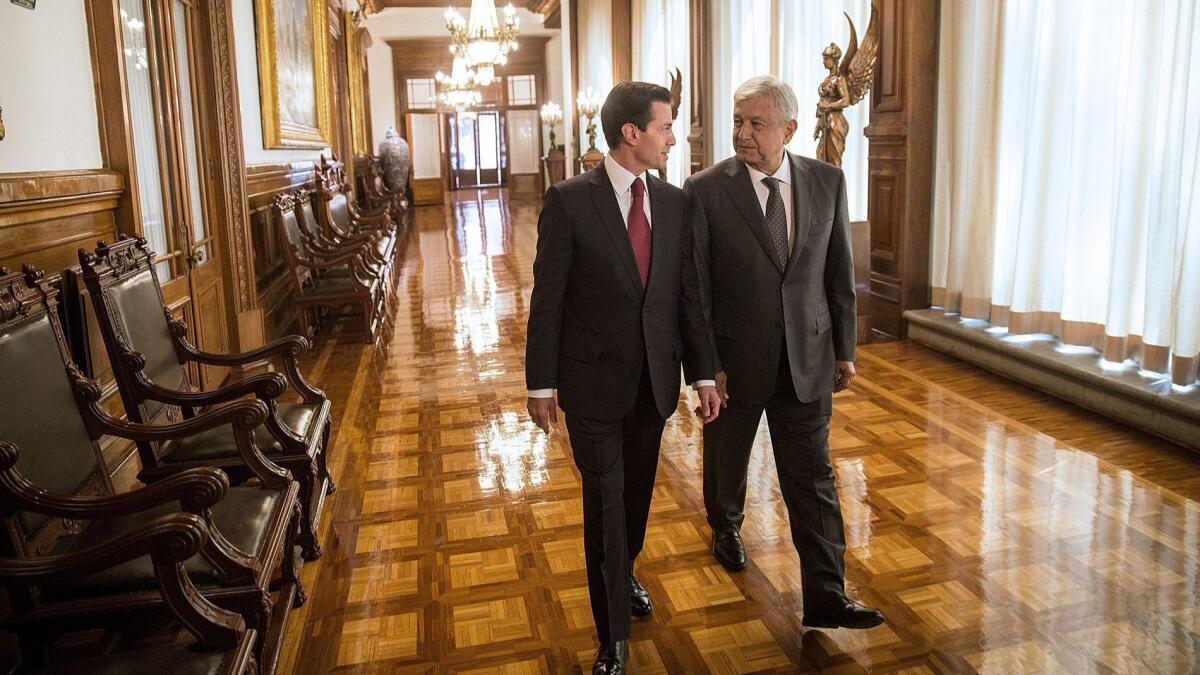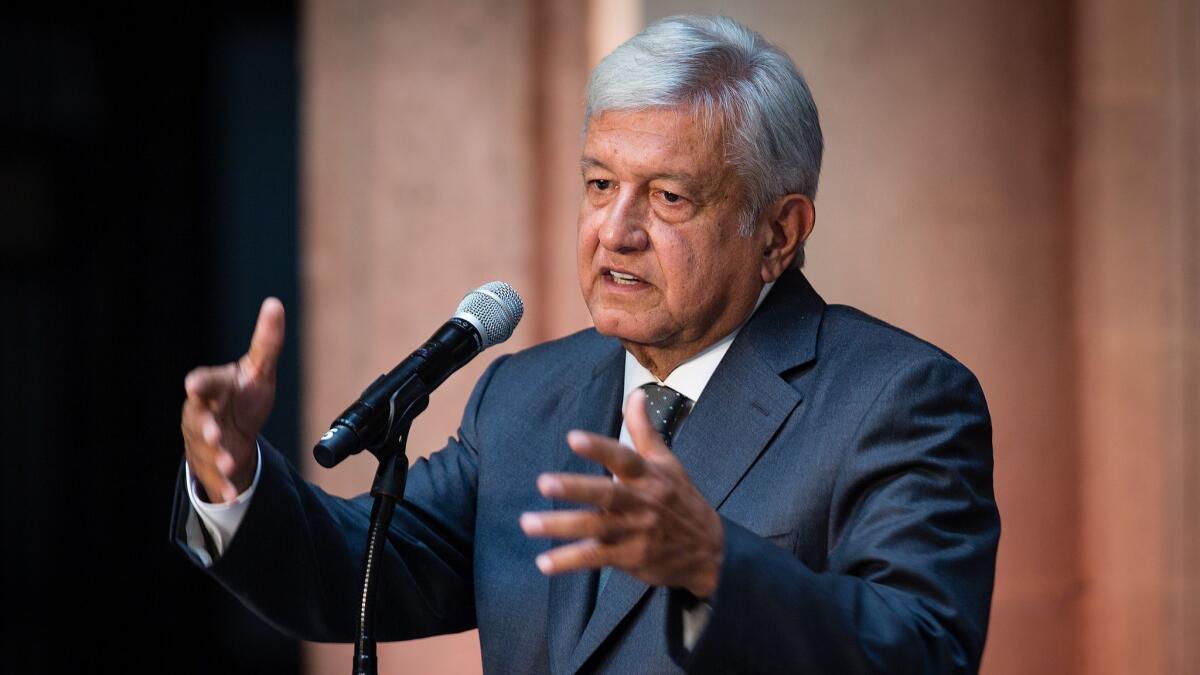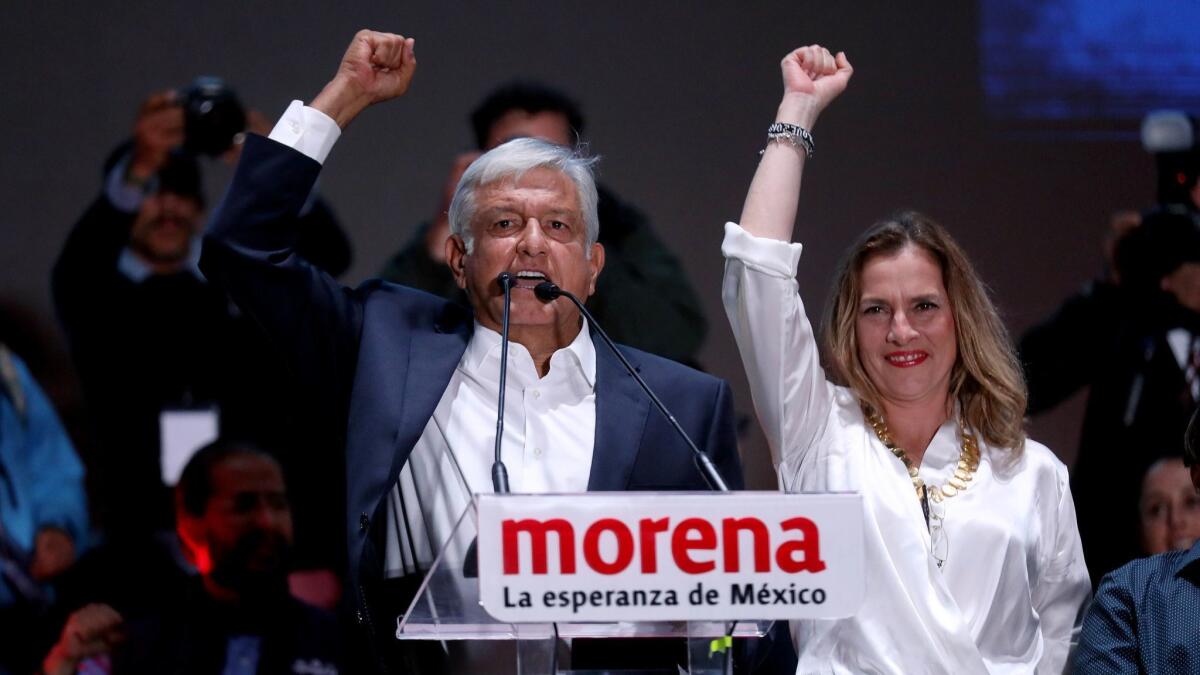Lopez Obrador and Mexican President Peña Nieto meet and talk transition

- Share via
Reporting from Mexico City — Mexican President Enrique Peña Nieto and the man just elected to succeed him, Andres Manuel Lopez Obrador, met Tuesday and discussed a number of contentious issues — including the country’s sluggish economy, spiraling violence and ongoing negotiations for a new free-trade agreement with the United States and Canada.
During his election campaign, Lopez Obrador denounced the president as a corrupt tool of what he calls the “mafia of power” — an elite clique that he says has long manipulated the country to serve its own interests.
But in comments following the almost two-hour meeting at the ornate National Palace downtown, he praised Peña Nieto.
The president was “respectful,” “cordial,” displayed an “open attitude” and vowed to assist the transition, Lopez Obrador said in his first news conference since winning the election Sunday in a landslide.
“We are going to be respectful of Enrique Peña Nieto, the constitutional president of the nation,” he said.
Lopez Obrador, 64, a longtime Mexican politician and shopkeeper’s son from the southern state of Tabasco, is scheduled to take office on Dec. 1 for a single six-year term.
Though promising “radical” transformation, he has gone out of his way in the last two days to stress that his administration would respect the laws of the land and not make any abrupt breaks with the status quo.
“We are headed for change on the route of harmony,” Lopez Obrador said.
The encounter with the president is among a number of key meetings that Lopez Obrador is having this week. The busy schedule is designed in part to calm fears of investors and others that Mexico will be embarking on a destabilizing new path.

Lopez Obrador’s anti-establishment message resonated deeply this year with Mexican voters, many of whom are fed up with rising crime, a stalled economy and corrupt and ineffective politicians.
Lopez Obrador — who was defeated in Mexico’s previous two presidential races — ran under the banner of the leftist National Regeneration Movement, known as Morena, which he founded four years ago.
For years, he has pushed back against accusations that he would govern in the style of Hugo Chavez, the late Venezuelan socialist leader and longtime U.S. antagonist.
Lopez Obrador said he plans to meet on Wednesday with members of the business community, some of whom have voiced alarm at his left-wing agenda. Lopez Obrador has made it clear that his government would not expropriate assets and would respect the independence of the national bank.
“There will not be interference in financial matters,” he said.
Next week, he is slated to meet with U.S. Secretary of State Michael R. Pompeo in Mexico.
Many observers expect that Lopez Obrador — who is heavily influenced by a robust Mexican nationalist tradition — will generally be less accommodating to Washington than his recent predecessors, who were mostly technocrats.
Lopez Obrador had said that he wants a renegotiated free trade deal with the United States and Canada that would help Mexican industry, agriculture and workers.
The North American Free Trade Agreement, almost a quarter-century old, has become a linchpin of the Mexican economy, which sends almost 80% of its exports to the United States. Mexico’s cheap labor is a key attraction for U.S. manufacturers. But Lopez Obrador has said he would fight for higher wages for Mexican workers. How that will play out in the renegotiation talks remained to be seen.
In coming months, Lopez Obrador said, he and his advisors will devise an action plan that he will present during an extensive trip throughout the country starting in September.
Formal cooperation between officials of the current administration and the incoming president’s team can begin only when Lopez Obrador is formally named president-elect by the Federal Electoral Tribunal. That process could take weeks.

This weekend, election officials are expected to certify official results of Sunday’s balloting, which saw Lopez Obrador win about 51% of the vote and vanquish his closest challenger by around 30 percentage points, according to the results that have been released.
If the numbers stand, Lopez Obrador would be the first Mexican president to take office with a majority since Carlos Salinas de Gortari in 1988, then-candidate of the long-dominant Institutional Revolutionary Party. But Salinas took office amid widespread allegations of electoral fraud.
Electoral results released to date also indicate that Lopez Obrador’s Morena party and its allies will have majorities in Mexico’s next Congress, a fact that would help the new president carry out his agenda of sweeping change.
On the issue of security, Lopez Obrador said he planned to invite Pope Francis to Mexico to assist in finding a solution.
In general, Lopez Obrador has blamed violence on rampant inequality and a lack of opportunity and social mobility for many Mexicans, especially the young. He has said that he opposes fighting “violence with violence,” but would seek to improve economic horizons for all so that many people did not have to turn to crime.
Lopez Obrador, who blamed electoral fraud for his two previous defeats, praised how the process unfolded Sunday.
“There was no factional intervention by the apparatus of the state in the electoral process,” he said, giving credit to Peña Nieto for “free and clean” elections. “That was something we hadn’t seen in recent times.”
On Tuesday, he reiterated a number of campaign promises, including cost-cutting measures that he said would free up funding for boosting pensions, scholarships and other social programs.
He said he would be earning less than half of the current president’s salary, that he would travel via commercial airliners and not government aircraft, and would turn Los Pinos — the official presidential residence — into a showcase venue for Mexican art and exhibitions. He also said he planned to discontinue use of the military chief of staff’s personnel in the presidential security detail.
Cecilia Sanchez of The Times’ Mexico City bureau contributed to this report.
Twitter: @PmcdonnellLAT
More to Read
Sign up for Essential California
The most important California stories and recommendations in your inbox every morning.
You may occasionally receive promotional content from the Los Angeles Times.













